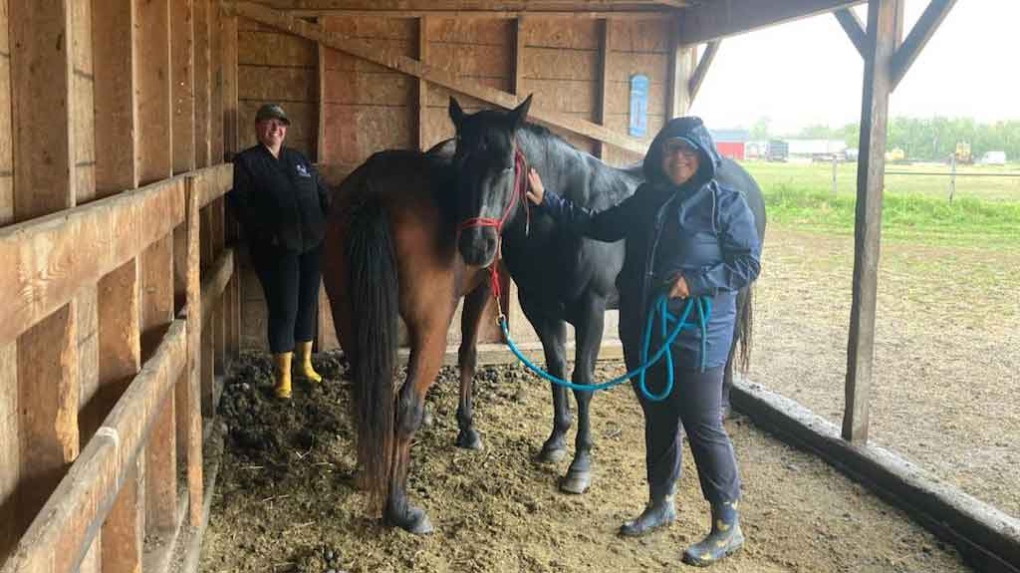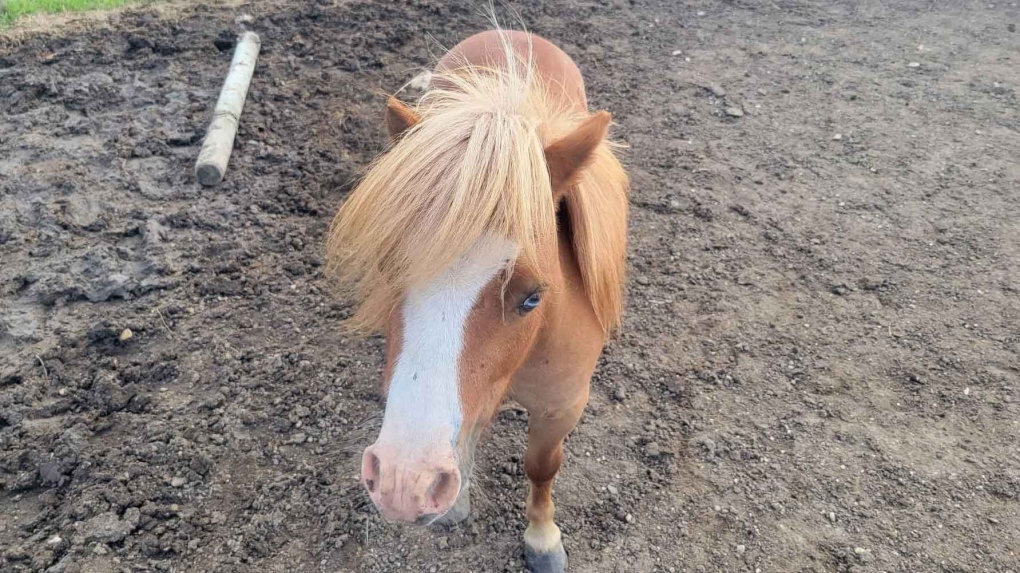Manitoba animal rescues struggling to cover costs amid inflation hikes
 Sherri Anderson said it costs about $200 a month to care for each horse, donkey or mule in her care at The Barefoot Ranch Horse Rescue and Sanctuary. (Source: The Barefoot Ranch Horse Rescue and Sanctuary/Facebook)
Sherri Anderson said it costs about $200 a month to care for each horse, donkey or mule in her care at The Barefoot Ranch Horse Rescue and Sanctuary. (Source: The Barefoot Ranch Horse Rescue and Sanctuary/Facebook)
Some Manitoba animal rescues say the rise in inflation driving up the cost of gas and food is also making it hard to care for vulnerable animals.
Sherri Anderson is president of The Barefoot Ranch Horse Rescue and Sanctuary, a non-profit organization north of Teulon, Man. providing surrendered horses, donkeys and mules with food, shelter and care until they can be rehomed.
Anderson said the cost of feed continues to fluctuate uncontrollably, while hay prices are also unpredictable.
“Last year was really rough because the bales were $100 each. Now, the prices are a little bit lower. We're looking at about $70 per round bale,” she explained.
In its latest monthly consumer price index report, Statistics Canada said grocery prices rose at the fastest rate since 1981, with prices up 10.8 per cent compared with a year ago.
Meantime, gas prices were up 22.1 per cent in August compared with a year ago, but down 18.8 per cent since June.
READ MORE: Canada’s inflation rate cools in August but grocery prices continue to climb
Anderson said each horse costs about $200 a month to care for, barring any medical complications, which the organization also covers. The ranch is currently caring for 58 horses in total.
 Twister and Whisper are one of 58 horses currently being cared for by Anderson and her team. (Source: The Barefoot Ranch Horse Rescue and Sanctuary/Facebook)
Twister and Whisper are one of 58 horses currently being cared for by Anderson and her team. (Source: The Barefoot Ranch Horse Rescue and Sanctuary/Facebook)
Anderson’s rising expenses are further exacerbated by an increase of surrenders coming to the ranch. She said many folks are having to downsize their herds because they can’t afford to care for as many.
“We’ve taken in a lot more this year than any other year,” she said.
Rehoming the horses has also become more and more difficult, as folks with space for them are also more cash-strapped and therefore, less likely to adopt.
To offset their mounting costs, the ranch relies on fundraising and donations from the public. Anderson also works two jobs.
“I would say for every dollar of donation we get, I put into it $2 out of my own pocket,” she said.
 Billy the miniature pony is one of 58 residents at the animal sanctuary that cares for surrendered, horses, donkeys and mules. (Source: The Barefoot Ranch Horse Rescue and Sanctuary/Facebook)
Billy the miniature pony is one of 58 residents at the animal sanctuary that cares for surrendered, horses, donkeys and mules. (Source: The Barefoot Ranch Horse Rescue and Sanctuary/Facebook)
If adoption doesn’t pick up, Anderson worries they’ll have to shut their doors for intake.
The organization is aiming to be registered as a charity soon, so they can accept government grants and larger corporate sponsorships.
In the meantime, Anderson is hoping fundraising dollars will hold the organization over.
“I just want to make sure that the horses are all safe and taken care of. Whatever that takes, I’m willing to do.”
DONATIONS DOWN 40 TO 50 PER CENT
Lindsay Gillanders, a volunteer with Manitoba Underdog Rescue said their organization has a lot of supplies donated, so rising costs are not as high of a concern for their non-profit.
However, donations have dropped off drastically since inflation began to spike.
“Trying to deal with gas being $1.70, a litre and corn costing a fortune, our donations are greatly down, which is understandable because people have to pay their bills before they can help charities and organizations like ours,” Gillanders told CTV News Winnipeg.
She estimates donations have dropped by 40 to 50 per cent. As a result, the rescue has had an intake freeze, meaning they can only accept the most acute cases.
“We’re really trying to make sure that we're maximizing our impact, and networking out dogs that are a little bit more or less difficult to other rescue partners and organizations,” she said.
CTVNews.ca Top Stories

Donald Trump says Canada becoming 51st U.S. state 'a great idea'
U.S. President-elect Donald Trump is taking aim at Canada once more, saying it would be 'a great idea' to make it America's ‘51st state.'
'You're either with Beijing or you're with Washington': Ford says to Mexico in CNN interview
Ontario Premier Doug Ford has a message for Mexico as the threat of tariffs by incoming president Donald Trump hangs over both sides of the U.S. border.
There are 88 new Order of Canada appointees. Here's a look at some of the most notable names
Ryan Reynolds, Scott Oake and Maureen Ann Jennings are among the 88 new recipients of the Order of Canada.
NEW These seniors were hit by the affordability crisis in a different way. They're having to support their children and grandchildren
With the high cost of living increasingly a concern, some seniors are making sacrifices to help their adult children and grandchildren make ends meet. Here are some of their stories.
Thousands of toddler step stools recalled after child's head gets stuck
Thousands of toddler step stools are being recalled after a child's head got stuck in one.
Iconic Halifax ship Theodore Too partially sunk at Ontario dock
An iconic ship that was a fixture in Halifax Harbour for 21 years has partially sunk in Ontario.
Brazilian judge orders Adele song removed over plagiarism claim
A judge in Rio de Janeiro has ordered the global removal of a 2015 song by British singer Adele due to a plagiarism claim by a Brazilian musician, which Universal Music is fighting on appeal.
After scamming their victims, some con artists go on to scam our courts with impunity
Convicts, including fraudsters, are skipping out on their court-ordered payments to their victims to the tune of tens of millions of dollars across the country, according to figures obtained by CTV W5.
Synagogue on Montreal's West Island targeted by alleged arson
A synagogue on Montreal's West Island was the target of an alleged arson attack.

































